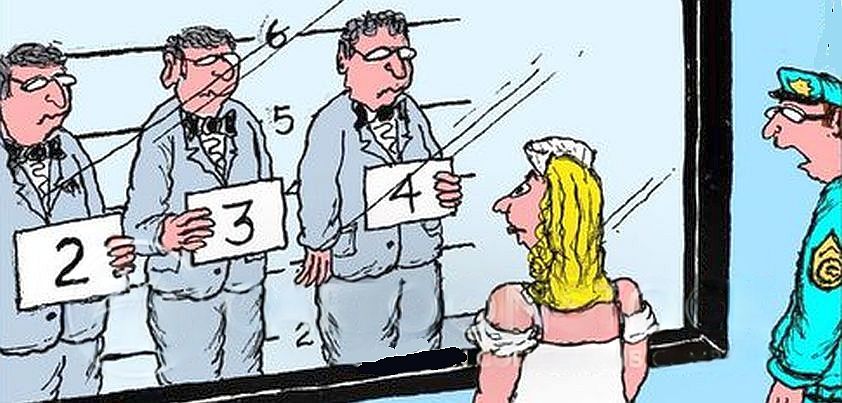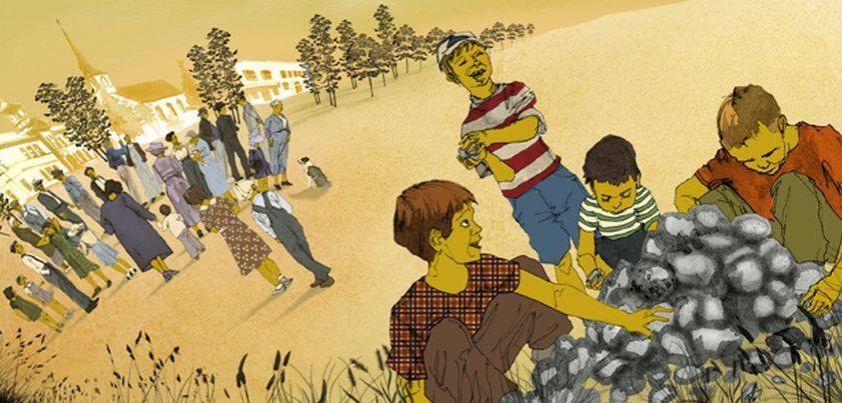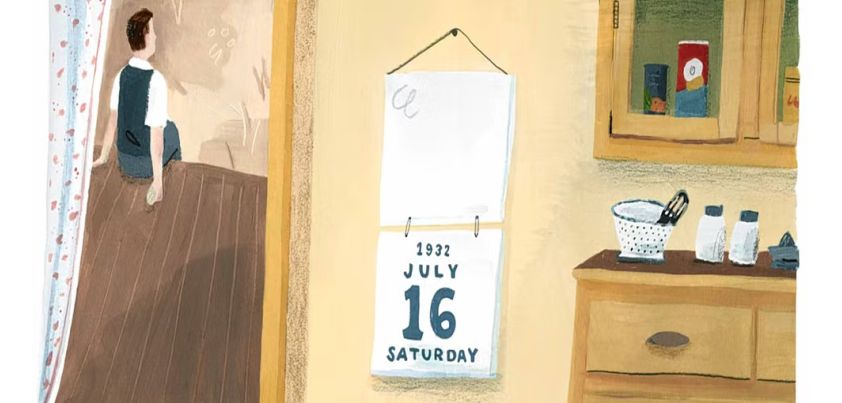 In this haunting psychological horror story by Shirley Jackson a woman wakes on what was to be her wedding day to realize that: 1) she may have been used and duped by a dapper writer’s promise of marriage; and 2) contrary to social expectations of the day, she may find herself “left on the shelf” at age thirty-four. In her desperatione to find the man she shows signs of mental instability, questioning whether the proposal was real or imagined. Themes include isolation and loneliness, social pressure, manipulation, imagination vs. reality, denial, obsession. More…
In this haunting psychological horror story by Shirley Jackson a woman wakes on what was to be her wedding day to realize that: 1) she may have been used and duped by a dapper writer’s promise of marriage; and 2) contrary to social expectations of the day, she may find herself “left on the shelf” at age thirty-four. In her desperatione to find the man she shows signs of mental instability, questioning whether the proposal was real or imagined. Themes include isolation and loneliness, social pressure, manipulation, imagination vs. reality, denial, obsession. More…
Archives
One Ordinary Day, With Peanuts
 The protagonist in this story from Shirley Jackson initially appears too good to be true. A seemingly ordinary man fills his pockets with candy and peanuts and walks the streets of New York, helping strangers and acting “Mr. Nice Guy”. The apparent theme is making a difference… how a good deed, a kind word, or even just a smile can brighten up someone’s day. It is not until we reach the end of the story that we are presented with two other themes: things are not always what they seem, and the duality of good and evil. More…
The protagonist in this story from Shirley Jackson initially appears too good to be true. A seemingly ordinary man fills his pockets with candy and peanuts and walks the streets of New York, helping strangers and acting “Mr. Nice Guy”. The apparent theme is making a difference… how a good deed, a kind word, or even just a smile can brighten up someone’s day. It is not until we reach the end of the story that we are presented with two other themes: things are not always what they seem, and the duality of good and evil. More…
The Lottery
 Author Shirley Jackson had no idea of the angry reaction The Lottery would receive when it first appeared in 1948. The story tells how each year the otherwise ‘normal’ people in a small American farming town perform a gruesome ritual to ensure a favorable growing season. The major theme is how herd or mob mentality can drive people to do things they would never consider individually. Other themes include dystopia, gender roles, violence and cruelty (human sacrifice), acceptance (the blind following of tradition), and man’s inhumanity to man (the potential for evil in all of us). More…
Author Shirley Jackson had no idea of the angry reaction The Lottery would receive when it first appeared in 1948. The story tells how each year the otherwise ‘normal’ people in a small American farming town perform a gruesome ritual to ensure a favorable growing season. The major theme is how herd or mob mentality can drive people to do things they would never consider individually. Other themes include dystopia, gender roles, violence and cruelty (human sacrifice), acceptance (the blind following of tradition), and man’s inhumanity to man (the potential for evil in all of us). More…
The Possibility of Evil
 The major theme of this Shirley Jackson story is that appearances can be misleading. A secondary theme, which is particularly relevant these days, is ‘fake news’. Miss Strangeworth, who possibly suffers from OCD, believes that her letters, although based purely on suspicion, are for the good of the community. Her objective may be noble, but many of the thoughts expressed are evil. The story’s message is two-fold: 1) we must be constantly on guard against the “possibility of evil”; and 2) evil is sometimes committed under the guise of seemingly good causes. Other themes: heritage, haughtiness, alienation, community, revenge. More…
The major theme of this Shirley Jackson story is that appearances can be misleading. A secondary theme, which is particularly relevant these days, is ‘fake news’. Miss Strangeworth, who possibly suffers from OCD, believes that her letters, although based purely on suspicion, are for the good of the community. Her objective may be noble, but many of the thoughts expressed are evil. The story’s message is two-fold: 1) we must be constantly on guard against the “possibility of evil”; and 2) evil is sometimes committed under the guise of seemingly good causes. Other themes: heritage, haughtiness, alienation, community, revenge. More…
Showdown
 A major theme of this Shirley Jackson story is community responsibility in preventing violence. Before the “showdown”, young Billy’s Saturdays were quiet and uneventful. When Tom Harper’s death breaks the pattern, a mystical power puts Billy (and possibly other townspeople) into a time loop. After many repeated Saturdays, Billy realizes that to break the cycle he must do something to prevent Tom’s death. Could the “haunting” be a result of Tom’s girlfriend Susy’s promises: I won’t ever forget you, and neither will anyone else! I’ll see that they don’t get off easy! Other themes: violence, love, hope, revenge, the supernatural. More…
A major theme of this Shirley Jackson story is community responsibility in preventing violence. Before the “showdown”, young Billy’s Saturdays were quiet and uneventful. When Tom Harper’s death breaks the pattern, a mystical power puts Billy (and possibly other townspeople) into a time loop. After many repeated Saturdays, Billy realizes that to break the cycle he must do something to prevent Tom’s death. Could the “haunting” be a result of Tom’s girlfriend Susy’s promises: I won’t ever forget you, and neither will anyone else! I’ll see that they don’t get off easy! Other themes: violence, love, hope, revenge, the supernatural. More…
Pillar of Salt
 In this story by Shirley Jackson, a New Hampshire couple’s idyllic holiday in New York goes awry when the woman panics after falsely thinking a building they were in was on fire. She sees the once bright, exciting city differently, losing confidence among the crowds and imagining decay everywhere. When the couple discover a body part on a Long Island beach, she spins out of control. The next day, alone on a crowded sidewalk, she is too scared to even cross the street. Themes include loss of identity (powerlessness and invisibility among the crowds), anxiety, paranoia, fear. More…
In this story by Shirley Jackson, a New Hampshire couple’s idyllic holiday in New York goes awry when the woman panics after falsely thinking a building they were in was on fire. She sees the once bright, exciting city differently, losing confidence among the crowds and imagining decay everywhere. When the couple discover a body part on a Long Island beach, she spins out of control. The next day, alone on a crowded sidewalk, she is too scared to even cross the street. Themes include loss of identity (powerlessness and invisibility among the crowds), anxiety, paranoia, fear. More…
Charles
 Most readers see Laurie, the subject of this Shirley Jackson story, as a naughty boy who tries to gain attention in kindergarten by misbehaving. He creates an alter ego named Charles to tell his parents what happens at school and later, to explain getting home late. However, there is an equally possible alternative interpretation. Laurie may have behaved quite normally at school and created an imaginary naughty classmate to gain attention at the dinner table. Both are consistent with the teacher’s vague assessment of Laurie. Either way, themes include behavior, identity, the desire for attention, deception, ambiguity. More…
Most readers see Laurie, the subject of this Shirley Jackson story, as a naughty boy who tries to gain attention in kindergarten by misbehaving. He creates an alter ego named Charles to tell his parents what happens at school and later, to explain getting home late. However, there is an equally possible alternative interpretation. Laurie may have behaved quite normally at school and created an imaginary naughty classmate to gain attention at the dinner table. Both are consistent with the teacher’s vague assessment of Laurie. Either way, themes include behavior, identity, the desire for attention, deception, ambiguity. More…
The Witch
 Although very short (just over 1,400 words), there are enough dark elements in this Shirley Jackson story to unsettle most readers. An imaginative four-year-old travelling on a train with his mother and infant sister attracts the attention of a man who recounts how much he loved his own sister. The man then relates how, after killing and dismembering his sister, he fed her head to a bear. The story turns on who or what the man is, and what effect his story may have on the boy. Themes include parental inattention, boredom, imagination, witchcraft, innocence and its possible manipulation, violence. More…
Although very short (just over 1,400 words), there are enough dark elements in this Shirley Jackson story to unsettle most readers. An imaginative four-year-old travelling on a train with his mother and infant sister attracts the attention of a man who recounts how much he loved his own sister. The man then relates how, after killing and dismembering his sister, he fed her head to a bear. The story turns on who or what the man is, and what effect his story may have on the boy. Themes include parental inattention, boredom, imagination, witchcraft, innocence and its possible manipulation, violence. More…